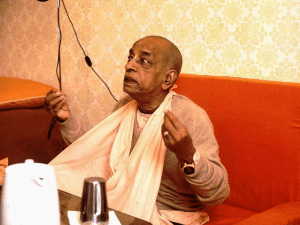I was disappointed...
Visakha Devi Dasi: One afternoon I knocked on Prabhupada’s door, heard “come in," and entered. The curtains were drawn, and it took time for me to adjust to the weak yellow light from the desk lamp on the low table Prabhupada sat behind. Like all the rooms he occupied, this one was pervaded by a youthful verve.
“May I ask a question?” I said.
Prabhupada had his eyes closed. For a moment he didn't answer.
“Yes,” he said, slowly, looking at me.
I'd been trying to understand how the modes of material nature—goodness, passion, and ignorance—worked. The Bhagavad-gita explains that a person in the mode of goodness is knowledgeable, moral, and pious, but with a tendency to be self-satisfied. In passion, one is a slave to lust, greed, hard work, and the desire for prestige. And in ignorance, one is a prisoner of laziness, moroseness, and illusion. What I didn't understand was what Prabhupada had written in his introduction to the Bhagavad-gita, namely that “material energies are in the mode of ignorance.”
I could have asked Prabhupada about anything in the whole magnificent creation on that sultry afternoon, but I said, “If we take a single material atom, is it in the mode of ignorance, or is it covered by the mode of ignorance?”
Prabhupada responded as if this were the most natural question in the world for a sari-clad young American woman in the middle of India to ask him. “It is covered by ignorance,” he said. “All energy comes from Krishna and so all energy is originally spiritual. But when it’s separated from Krishna due to our lack of understanding, our forgetfulness, then it appears material.”
Prabhupada closed his eyes and broadened the topic.
“We should not be satisfied to remain in a neutral position, simply regarding Krishna with awe and veneration," he said. “Of course, even passive appreciation of Krishna's greatness is good, but better is to actively serve him.”
I realized that Prabhupada was not just answering my question but speaking to me, nudging me to go beyond the mind and intellect, for Krishna created those and could not be encompassed by them unless he allowed himself to be. And he allowed himself to be when we reciprocated his love. Krishna wanted my love and my love was expressed through bhakti, through serving him and his creation with devotion.
I'd heard what Prabhupada told me many times, but never spoken by him to me alone. I'd been photographing and studying and, from a safe, neutral place, remaining emotionally distant. Prabhupada was encouraging me to try the richer flavors of devotional service and in that way transcend my introversion, inhibitions, and fears—to be more than a quiet, detached observer. He was urging me to reciprocate with God.
Before Prabhupada, I felt vulnerable, receptive, responsive. My mask fell away. I knew he was trying to help me and that I needed his help. I was incredibly sick of having a love for Krishna and his creation inside me and being unable to feel or express it. I longed to feel more. Prabhupada was broadly casting vibrant seeds of bhakti and anyone, even a neophyte like me, who came near just one of them was swept up by their potency. Once again, my entrenched skepticism dissolved and Prabhupada's categorical conviction coalesced within me.
And his words also startled me a little. I found myself leaning closer to his desk as if physical proximity and a careful study of his features would help me grasp his meaning. Prabhupada looked at me, now just four feet away, as I thanked him, grateful for his concern.
I left, torn. On one side, I was disappointed by my stubborn, cautious self. On the other, I felt emboldened by Prabhupada to flourish as an ecstatic devotee of Krishna. If only I could break through the shell of this obstinate mind that covered me, just as the mode of ignorance covered the material atom.
